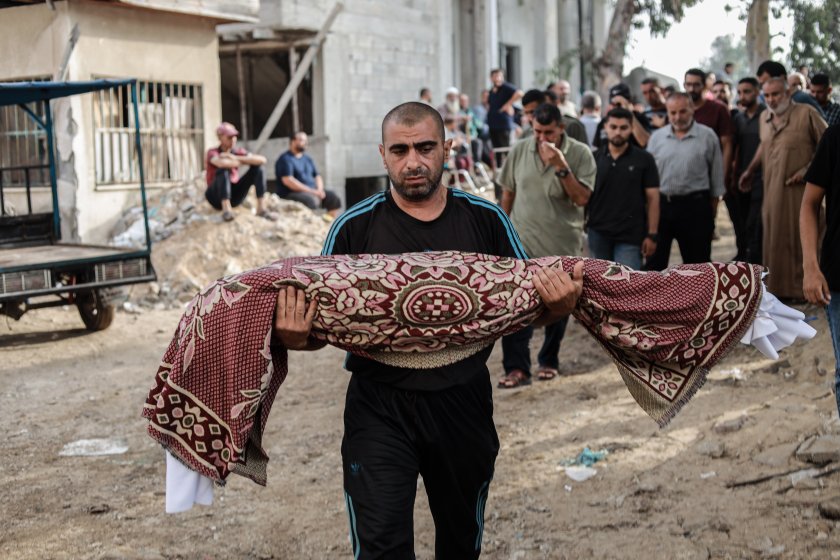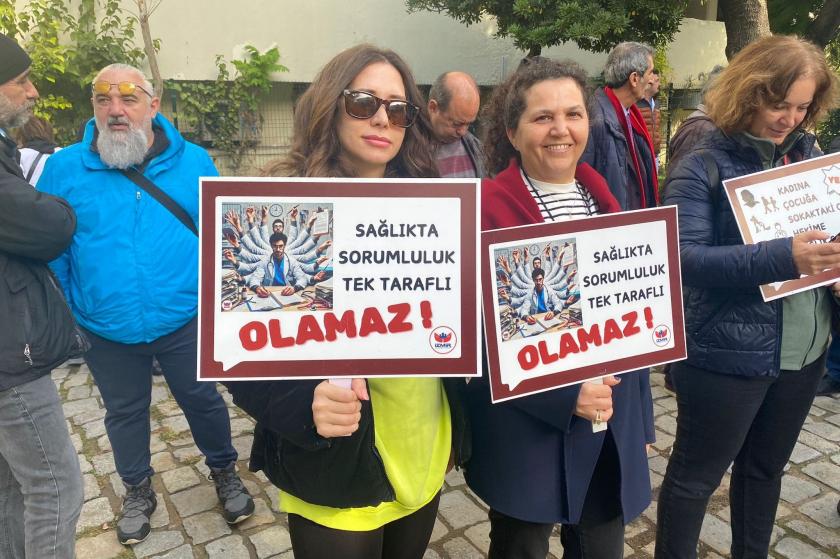AKP government has declared a war on the right to information
During the commemoration of Suruc massacre, held in Kadikoy, 8 news reporters became subjected to plastic bullets, pepper spray, and physical violence of police. Reporters told on what they went through. Professional associations raised concerns.

Fotoğraf: @_erdemsahin (Kaynak: TGS)
Gozde TÜZER
Eylem NAZLIER
İstanbul
On July 20 in Kadikoy, marking the sixth anniversary of the Suruc massacre, a memorial function was organized to commemorate the lives lost, and to condemn the massacre. Many press reporters also attended the event. Those participated in the event became subjected to plastic bullets, pepper spray, and physical and verbal disturbance of the police. Eight reporters reporting on the event also got wounded. Press professional organizations raised opposition to the incident created.
“NEWS REPORTING IS PUBLIC SERVICE OF A JOURNALIST”
General chair of the Journalists’ Union of Turkey, Gokhan Durmus reminded of the experience of last month of Bulent Kilic, an AFP reporter; talking about the police conducting a harder line following a circular order by Internal Affairs Ministry about video recording of police in action by people. Indicating that they came out on streets demanding an end to such treatments of journalists, and stating “Journalism is not a crime and we continue to conduct journalism. We will not get used to and accept the violence against journalists!” Durmus said “Still, plastic bullets and gas bombs were thrown at journalists in Kadikoy at the protest of Suruc massacre. We do not approve of this.”
Stating “All kinds of violence is exercised on journalists in Turkey. Our colleagues are taken to trials and jailed. Journalists following up on social events are deterred by police to do their job. There is a huge contribution on such experiences of the government’s politics. Such conducts of police forces have to come to an end,” and indicating that it is besides the public job of journalists to report on such events occurring when police or gendarmerie confront and deter those laid-off workers defending their rights, those defending their identity, those villagers defending their natural water resources, Durmus added “Those police forces should be scrutinized and charged for deterring journalists for doing their job for public.”
“WE DISAPPROVE”
RSF representative of Turkey and Freedom of Media Reporter of Bianet, Erol Onderoglu also said “Security forces may not view it as public duty to deter journalists from doing their job, we disapprove of this! Unfortunately, such politics make it a permanent, hostile view of police on media associates.” Reminding that the security organization ‘apologized’ on June 26 for battering Bulent Kilic while being taken into custody; however it has deemed the very same violence proper for many journalists such as Yasin Akgul, Fatos Erdogan, Eylem Nazlier, and Berkcan Zengin, he continued as follows “However, it seems that the authorities turned a deaf ear on the issues we voiced in the function carried out at the end of June in front of Istanbul Governor’s office. We should render our issues visible to the public opinion through mass solidarity, and continue our efforts to fight against injustice.”
“POLICE MUST PROVIDE FOR THE SAFETY OF LIFE AND THE SECURITY OF JOURNALISTS”
The executive board of the Association of Journalists of Turkey issued a statement condemning the police violence against 8 journalists. It said “Those individuals and institutions, who tend not to understand that the press is an indispensable part of democracy in Turkey, are triggering the verbal and physical violence against journalists in order to deter people’s right to be informed,” and emphasized that the duty of the security forces is not to deter journalists, but to provide for their safety and security while they do their jobs.
“A PROBLEM OF DEMOCRACY”
DISK Basin Is Chair, Faruk Eren said “Those whose only concern is journalism, whose only weapon is pencil are easily made a target.” Reminding that there have been many journalists murdered, from Abdi Ipekci to Ugur Mumcu; from Metin Goktepe to Musa Anter; Eren said “It is a very troubling situation to be in, from our profession point of view, that journalists are subjected to such attacks by security forces as that of yesterday. This is a general problem of democracy. People are to look after their right to be informed and journalists.”
“A PLASTIC BULLET STRUCK ME AT MY LEG”
Photo-journalist of EPA, European Pressphoto Agency, Erdem Sahin, expressing that he got wounded in his leg and groin as the result of the police interference while he was attending the commemoration; describing that the police, interfering roughly with the group gathered for the commemoration, used plastic bullets and their shields while they were trying to get the journalists out of the area, said “At that moment, a plastic bullet struck my leg. We, as journalists, want such behaviours to end soon, which we have been experiencing for a long time. Journalism is not a crime.”
“POLICE DID NOT WANT THE IMAGES PUBLISHED”
Eylem Nazlier, journalist of our newspaper, describing that she ran into a heavy police blockade in Kadikoy, also said “When the mass started to adjourn the event, police interfered very fiercely right after announcing that the crowd could not march in protest. Many youth had their chins and noses broken, women’s t-shirts were torn. The area turned into a war zone. I felt I was in a war zone.”
Reporting that youth were on the ground with police on top of them, that they were handcuffed behind their back, and that they were in positions unable to breath, Nazlier said “They interfered with us also in a severe way while we were taking images. Because they did not want these images published, there was a very heavy rights violation. The violation also continued in custody vehicles. They wanted to get the vehicles out of the area. In the meantime, they fired with plastic bullets, TOMA hit the crowd with pressurized water. They struck people with their shields. Some of our friends got affected by pepper spray. There were people wounded by plastic bullets. We had friends kicked and fisted.”
Nazlier continued as follows: “We continued on taking images. It is our responsibility to get the right information to reach people. Recently, we, journalists working in the field, become subjected to very hard interventions. Government is trying to deter in this manner the journalists who are after the truth and not compliant with government politics.”
“PLASTIC BULLETS FIRED, GAS USED”
Meral Danyildiz, journalist from BirGun, stated that they were tasked with informing people of the events, but at this point, they became unable to practice journalism: “We were made subjected to physical and verbal violence while we try to get information. First the press was taken out of the area, right after that plastic bullets were fired and gas was used. Nobody is free if the press is not free. Nobody can hear if the journalist cannot publish. We are opposed to our profession being trampled on.”
“POLICE FIRED TWO PLASTIC BULLETS AT MY LEG”
Yasin Akgul, Agency France-Presse (AFP) Stringer Photo-Journalist, reported that, at the time he started taking images of those that remained in the area and became subjected to plastic bullets of police, all the press was begun to be taken out of the area with the order of the Security Commissioner of Kadikoy Municipality: “At that moment, I saw a female protestor being taken into custody by two male police officers, and I started taking pictures. The Security Commissioner of Kadikoy Municipality grabbed my arm and asked who I was, while I was taking the pictures of the young woman with her t-shirt torn up, her chest exposed, and being taken away by two police officers. When I responded as “Journalist,” an undercover police officer and a member of the quick response police team tried harshly to throw me out of the area. Right at that second, I saw other journalists being pushed away with police shields. A member police of the quick response team fired at my leg in a close distance two times one after another.”
Akgul commented that the adverse position of police towards those associated with press had been taken to serious levels since the circular order of Internal Affairs Ministry regarding taking images in public spaces.
“VIOLATED PHYSICALLY”
Hayri Tunc, a journalist, stating that the intervention of police started simultaneously on journalists and the mass of protestors, also said: “The image taking and recording of AFP Photo-journalists, Bulent Kilic and Yasin Akgul, whom I was amongst at the beginning, was deterred many times. At one instance during recording, an undercover police officer tried to kick my camera. During that time, many of my friends got wounded with plastic bullets or with exertions of physical violence.”
Mentioning that police does not want any recording of its increasing violence towards the organized functions and activities, Tunc went on as follows: “We recorded the truth and published it. We will do so in the same manner. One day, these journalists and this press will be needed by them, too.”
“PUNCHED ON FACE WITH A FIST”
Journalist Emre Orman said “I was cornered in front of a TOMA vehicle, and I was punched in the face. It is very rare that a journalist is punched in the face. At the same time, plastic bullets struck at various parts of many of my friends. The strikes were made consciously, and they were targeted.” Reminding that the press workers carried out a function of “we cannot breath” in front of the governor’s office, Orman said that, after all that happened, the police had arrogantly said “We haven’t done anything, be calm.”
“FOUR POLICE KICKED AND FISTED”
Taylan Oztas, a journalist of Ozgur Gelecek, expressing that “reality of fascism” was behind the intervention with plastic bullets and pepper spray directed as much towards the mass of people as the press workers, he confirmed that police used plastic bullets and pepper spray. Mentioning that, along with the mass of people, the press workers were also heavily impacted, Oztas said “Fatos Erdogan’s finger is almost broken, Emre Orman is fisted. My phone is thrown on the ground.” Oztas became subjected to kicking and fisting of four police officers when he leaned to the ground to claim his phone back.
“WE WON’T REFRAIN FROM DOCUMENTING”
Pinar Gayip, journalist of Etkin Haber Ajansi (ETHA), also saying “they want to get away with it,” she continued as: “Many of our professionals became subjected to bombardment of plastic bullets, battered with shields. Phones of press workers, cameras of cameramen recording the event were taken away from them, and thrown onto the ground.” Gayip said “They know what they do is a crime. Our profession is standing where it changes the conception of crime. With this awareness, depite we are attacked, we will not refrain from documenting.”







Evrensel'i Takip Et